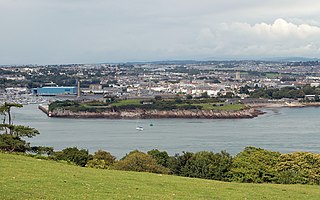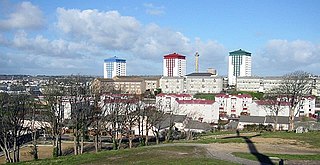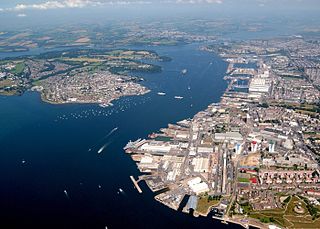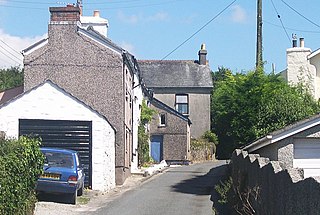
Barne Barton is an area within St Budeaux, Plymouth, Devon, England.

Barne Barton is an area within St Budeaux, Plymouth, Devon, England.
Barne Barton is located to the North West of Plymouth about 2 miles by road, or 1 mile as the crow flies, from the Tamar Bridge. From the southern side of the hill, there are panoramic views of the River Tamar and Cornwall. [1]
Barne Barton in the sixteenth century was a farm (the words 'Barne Barton' actually mean 'Barne Farm') and produced essentials such as meat, wheat, grain and potatoes. [2]
The area includes Bull Point Barracks which were built in the 1840s and 1850s to accommodate military personnel guarding the Bull Point Ordnance Depot. [3] Emmeline Pankhurst, the suffragette, was arrested and taken to Bull Point Barracks in 1913. [4]
In the 1960s Barne Barton became one of the largest naval estates within England providing accommodation for those serving in HMNB Devonport, Plymouth and on those warships stationed there. [2] As the might of the Royal Navy reduced, so did the number of sailors. This reduction in manpower subsequently necessitated a reduction in the number of military married quarters required for serving personnel. As the size of the Navy continued to shrink, the first part of the military estate was sold by the MOD at a discounted purchase scheme to serving members of HM Forces with Naval Personnel given first priority and they ended up in private ownership. After further reduction in the size of the Royal Navy more properties were passed over initially to Plymouth City Council and then to Devon and Cornwall Housing Association. The MOD retained a number of houses which were refurbished by Annington Homes and were sold off to the general public. [5] In July 2018 Clarion Housing Group submitted a planning application to redevelop the area with 200 new homes. [6]
The demolition of parts of the estate began on 11 June 2020, with the aforementioned new homes replacing them. [7]
A new school, known as Riverside Primary School, which amalgamates both Barne Barton and Bull Point primary schools, opened in 2008. [8]

Devon is a ceremonial county in South West England. It is bordered by the Bristol Channel to the north, Somerset and Dorset to the east, the English Channel to the south, and Cornwall to the west. The city of Plymouth is the largest settlement, and the city of Exeter is the county town.

Plymouth is a port city and unitary authority in Devon, South West England. It is located on the south coast of Devon, approximately 36 miles (58 km) southwest of Exeter and 193 miles (311 km) southwest of London. It is bordered by Cornwall to the west and southwest.

East Stonehouse was one of three towns that were amalgamated into modern-day Plymouth. West Stonehouse was a village that is within the current Mount Edgcumbe Country Park in Cornwall. It was destroyed by the French in 1350. The terminology used in this article refers to the settlement of East Stonehouse which is on the Devon side of the mouth of the Tamar estuary, and will be referred to as Stonehouse.

The Tamar is a river in south west England that forms most of the border between Devon and Cornwall. A part of the Tamar Valley is a World Heritage Site due to its historic mining activities.

Devonport, formerly named Plymouth Dock or just Dock, is a district of Plymouth in the English county of Devon, although it was, at one time, the more important settlement. It became a county borough in 1889. Devonport was originally one of the "Three Towns" ; these merged in 1914 to form what would become in 1928 the City of Plymouth. It is represented in the Parliament of the United Kingdom as part of the Plymouth Sutton and Devonport constituency. Its elected Member of Parliament (MP) is Luke Pollard, who is a member of the Labour Party. The population of the ward at the 2011 census was 14,788.

Saltash is a town and civil parish in south Cornwall, England. It had a population of 16,184 in 2011 census. Saltash faces the city of Plymouth over the River Tamar and is popularly known as "the Gateway to Cornwall". Saltash’s landmarks include the Tamar Bridge which connects Plymouth to Cornwall by road, and the Royal Albert Bridge. The area of Latchbrook is part of the town.

Bere Alston is a village in West Devon in the county of Devon in England. It forms part of the civil parish of Bere Ferrers.

Calstock is a civil parish and a large village in south east Cornwall, England, United Kingdom, on the border with Devon. The village is situated on the River Tamar 6 miles (9.7 km) south west of Tavistock and 10 miles (16 km) north of Plymouth.

Mount Edgcumbe House is a stately home in south-east Cornwall and is a Grade II listed building, whilst its gardens and parkland are listed as Grade I in the Register of Parks and Gardens of Special Historic Interest in England.

Calstock railway station is an unstaffed railway station on the Tamar Valley Line serving the village of Calstock in Cornwall, United Kingdom. It is situated at the north end of Calstock Viaduct which carries the railway at high level over the River Tamar.

His Majesty's Naval Base, Devonport is one of three operating bases in the United Kingdom for the Royal Navy and is the sole nuclear repair and refuelling facility for the Royal Navy. The largest naval base in Western Europe, HMNB Devonport is located in Devonport, in the west of the city of Plymouth, England.
Ernesettle is mentioned in the Domesday Book, which documented land in England and Wales, and describes as an ‘old Saxon manor’ there. By the 15th century, there were two farms, Great Ernesettle and Little Ernesettle, both named after William Ernstell, a freeholder of Budshead, who owned land here in 1428. By the 16th century, Ernesettle was a thriving hamlet, and Budshead Mill and a manor house were built on the bank of the river Their date of construction is uncertain, but in 1780 the owner was recorded as Sir Harry Trelawney and the tenant was Mr Robert Nicholls.

The History of Plymouth in Devon, England, extends back to the Bronze Age, when the first settlement began at Mount Batten a peninsula in Plymouth Sound facing onto the English Channel. It continued as both a fishing and continental tin trading port through the late Iron Age into the Early Medieval period, until the more prosperous Saxon settlement of Sutton, later renamed Plymouth, surpassed it. With its natural harbour and open access to the Atlantic, the town found wealth and a national strategic importance during the establishment of British naval dominance in the colonisation of the New World. In 1620 the Pilgrim Fathers departed from Plymouth to establish the second English colony in America. During the English Civil War the town was besieged between 1642 and 1646 by the Royalists, but after the Restoration a Dockyard was established in the nearby town of Devonport. Throughout the Industrial Revolution Plymouth grew as a major mercantile shipping industry, including imports and passengers from the US, whilst Devonport grew as a naval base and ship construction town, building battleships for the Royal Navy – which later led to its partial destruction during World War II in a series of air-raids known as the Plymouth Blitz. After the war was over, the city centre was completely rebuilt to a new plan.

The Cathedral Church of Saint Mary and Saint Boniface in Plymouth, England, is the seat of the Bishop of Plymouth and mother church of the Roman Catholic Diocese of Plymouth, which covers the counties of Cornwall, Devon and Dorset. The Diocese of Plymouth was created in 1850 after the issuing of the papal bull Universalis Ecclesiae. In 1858 the new condign cathedral was opened and put under the patronage of the Virgin Mary and Saint Boniface, the latter thought to have been born in Crediton in the area of the diocese.

Norris Green is a village in Cornwall, England, UK. It was enlarged from a farming hamlet so that it now adjoins the neighbouring village of Higher Metherell. Both settlements are within the civil parish of Calstock which borders the River Tamar, the county boundary with Devon in south-east Cornwall.
Devon League 1 is an English level eight rugby union league for clubs based in Devon. The champions are promoted to Cornwall/Devon and the runner-up plays the second team from Cornwall League 1, with the winning team gaining promotion. Up until the end of the 2017–18 season, teams were relegated to Devon League 2 but since that league has been abolished there is currently no relegation.

Luffincott is a civil parish in the far west of Devon, England. It forms part of the local government district of Torridge and lies about six miles south of the town of Holsworthy. The parish is surrounded clockwise from the north by the parishes of Tetcott, Ashwater, St Giles on the Heath and Northcott. Its western border follows the River Tamar which forms the county boundary with Cornwall.

Mary Elizabeth Phillips was an English suffragette, feminist and socialist. She was the longest prison serving suffragette. She worked for Christabel Pankhurst but was sacked; she then worked for Sylvia Pankhurst as Mary Pederson or Mary Paterson. In later life she supported women's and children's organisations.